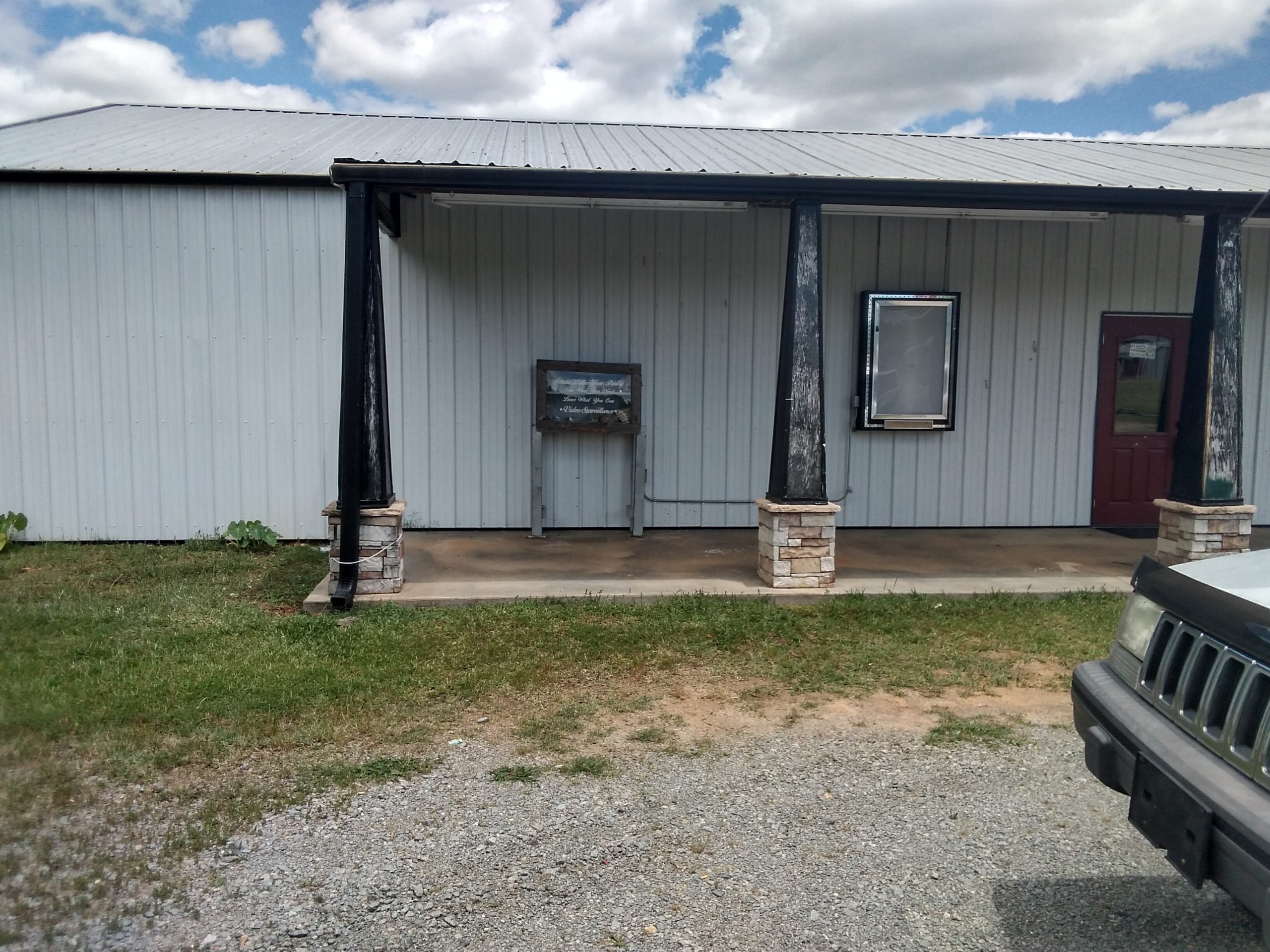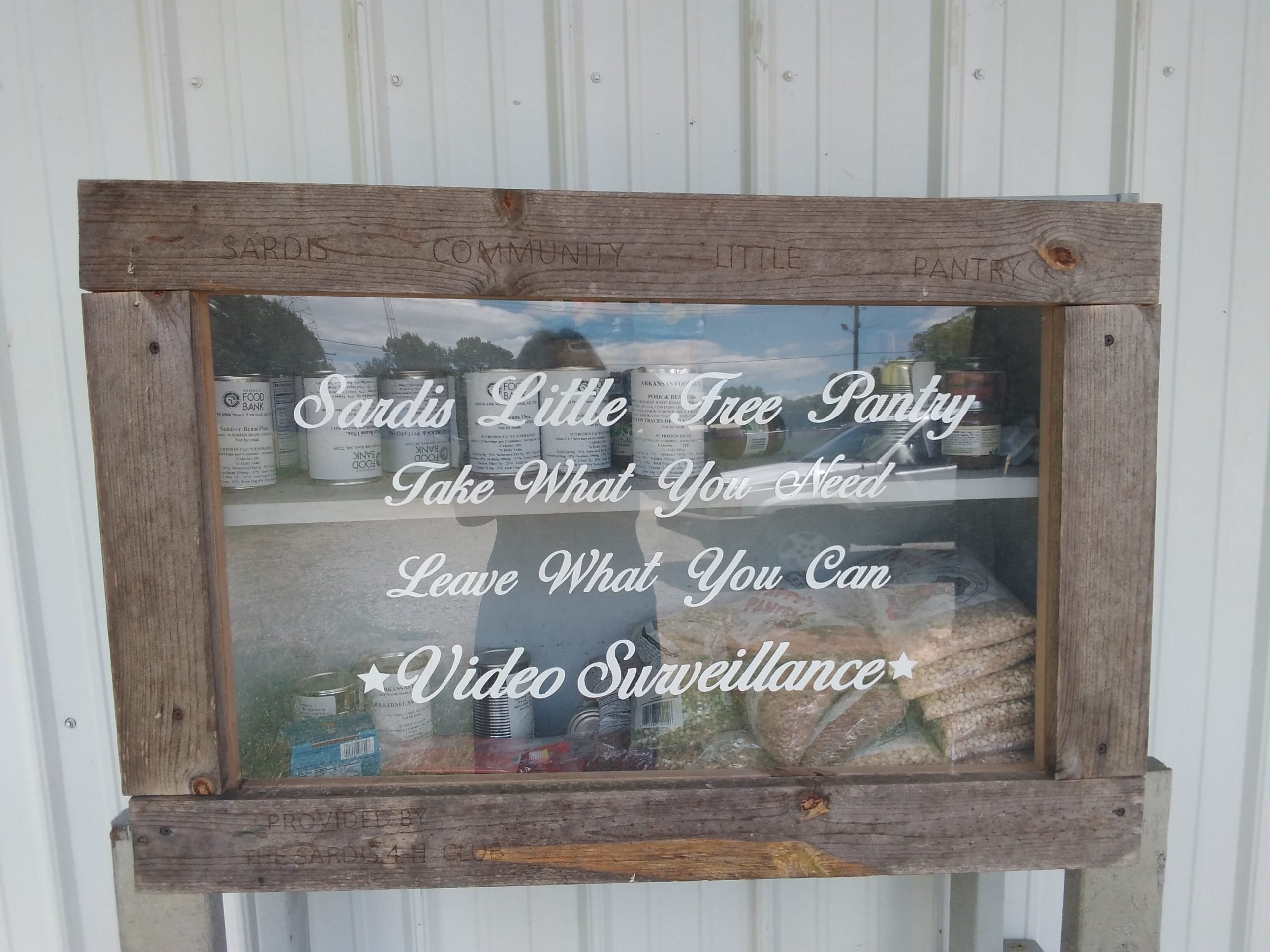The Nicest Place in Arkansas: Sardis
NICEST PLACES IN AMERICA 2020 FINALIST
"Tiny Pantry Big Heart"
A tiny, homegrown movement to make sure folks get the food they need while maintaining dignity spreads across the country.
Jana Blackwood doesn’t know exactly who visits the box up the road. She doesn’t know exactly who puts the food donations in, or who comes to take them out.
All she knows is that anybody passing through Sardis who needs a fresh egg can probably find one at the Little Free Pantry on North Sardis Road, across from the car wash and next to the Dollar General.
“I’ve never seen it empty,” says Blackwood, who nominated Sardis to be the Nicest Place in America.
Sardis is a dot on the map, representing the home of about 300 people, 23 miles south of Little Rock. “We don’t even rate a restaurant,” says Blackwood. Yet, the tiny community’s response to COVID-19 shows that there is no place in America that isn’t uniting to overcome the pandemic.
The Little Free Pantry is a dot inside the dot: a simple box near the road where residents can drop off food for whoever needs it. There’s no sign-in sheet, no income requirements, no staff bustling around trying to decide who deserves a free meal and who doesn’t. There’s just food—including eggs, whenever some local chicken coop churns out more than the farmer needs.
A helping hand has never been hard to find in Sardis, but you have to know where to look. The public face of this unincorporated rural community amounts to just a few businesses, schools and churches. Its most famous landmark is the late, great Shoe Tree, cut down in 2017, a local oddity which for reasons lost to time was festooned with old sneakers and hiking boots.

So it never exactly bustles in Sardis, and with the COVID-19 shutdown, things are quieter than ever. But the Little Free Pantry is always open, and its simplicity belies the depth of the movement behind it.
“I really see this as the mini-pantry’s moment,” says Arkansas’s Jessica McClard, who opened the first Little Free Pantry in nearby Fayetteville in 2016.
McClard launched the project at her local church, as a very personal way to give back to her community. But as her Little Pantry story spread on social media, interest in replication grew. Since she first stocked her box in Fayetteville, mini-pantries have sprung up nationwide and abroad. McClard’s website now lists over 1,100 sites mapped in the United States, Europe and Australia.
“The movement has been building for four years, but it’s really picked up steam during the pandemic,” McClard says.
The Little Pantries are a perfect response to COVID-19, with its social distancing demands and rising pressure on family budgets. Many have been opened in converted Little Free Libraries, neighborhood spots where people take and leave books they want to share.
“A 42-cent can of beans can be really big to somebody,” says McClard. “And the need to give is a human need, just like the need for food.”
Sardis’s mini pantry is just part of its COVID-19 response. Churches moved to “parking lot” services. Neighbors sponsored billboards to celebrate the high school seniors who didn’t get a public graduation ceremony. At one point, neighbors were filling their windows with stuffed animals so that families could drive by with their children to see the displays.
And Blackwood says that Facebook groups and churches have been steadily organizing, helping neighbors shop for groceries, visit the doctor, and study for online classes. You wonder how a place with so few people can muster such a wide-ranging and coordinated response. The secret is, they’re all in it together.
“I’ve seen so many people volunteer to help,” Blackwood says. “I’ve even done it myself.”
As many as one in five Arkansans could soon face food insecurity, says McClard, a problem that can sometimes seem insurmountable.
“Food insecurity, racial injustice—these things seem so huge,” says McClard. referring to both COVID-19-induced hunger as well as the renewed focus in America on racial issues following the death of George Floyd while in police custody. “Where you start is incredibly daunting. So, what I did was, I said, ‘I have neighbors that are hungry. What can I do to help?’”

The Nomination
To say that the year 2020 has been unusual would be a gross understatement amid the COVID-19 (CoronaVirus) pandemic. All one needs to do to see the devastation is to watch the local or national news channels or to listen to the radio for statistics. I have seen food shortages, long lines, hoarding, and price gouging on necessities. I have seen miracles happen too. However, amid all this negativity, I have witnessed people becoming more caring individually and as a group.
My community has become more caring. I live in the Sardis Community in Saline County Arkansas, just south of Little Rock. Sardis is a rural, unincorporated area with many “average, blue-collar workers” with a BIG heart for others. The community consists of a Dollar General, Sardis Water Association, a car wash, storage units, two or three gas stations, and numerous churches.
I chose Sardis as my home nearly 21 years ago and have never regretted it. I am a transplant from Pine Bluff, Jefferson County and moved here for my husband and me to be closer to our work. Everyone has been so welcoming and friendly since the beginning. How refreshing!
The community came up with the idea of having a “Little Pantry” to help those who need food. Anyone can drop off or pick up food as needed without embarrassment. Several neighbors with chickens take fresh eggs to the pantry and alert others of the egg availability. I have never seen a time when this pantry was empty due to the generosity of the community members. Sardis uses a facebook group to announce such things — facebook.com/sardiscommunity.
I have noticed, since March, people offering to purchase groceries, to help people get to doctor’s appointments, to offer to pick up curbside deliveries for those who are at a greater risk for COVID-19. I have seen others purchasing items for those afraid to shop in public and taking formula and diapers to new moms. The local churches have food pantries, although this is not a new thing for our little community. It seems as though people are becoming more caring and thinking outside of themselves more than in times past.
I am so proud of my little community with a big heart for others and hope that this one little area can be an inspiration for others. Sardis makes me happy in a time of uncertainty and fear.
This is a rural area where people know their neighbors and a handshake is still as good as a signature on any document. My situation has not changed greatly as I am a retired elementary school teacher who watches her grandchildren while their parents work. The grandchildren that stay with me on occasion are ages 5 and 2 months and there is no way I would risk their health by going into public and mingling until this virus abates. Perhaps the only thing that has changed for me is the availability to find foods to fit my dietary needs without physically shopping in a brick and mortar store. I have Celiac Disease, a soy allergy and a dairy allergy. A majority of these types of foods are not available in this area. The only other change has been my ability to take my grandchildren to playgrounds and parks and on our Saturday morning trip to the local Dollar General. My granddaughter loves our Saturday trips as she generally gets toys or candy.
While I have always perceived that my community was kind and caring, my community has become more caring and shows more concern for others who might be in need.
16085
What do you think of The Nicest Place in Arkansas: Sardis?